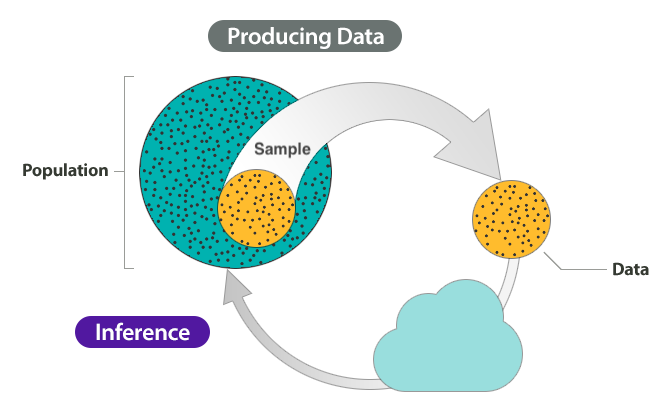QML - Week 2
Inference, uncertainty and variability
Inference

Bilingual advantage: myth or reality?
“Bilingual advantage” refers to the hypothesis that bilinguals possess a cognitive advantage over monolinguals due to greater cognitive control implied in using more than one language (Poarch and Krott 2019; Samuel et al. 2018).
However, research has argued both for and against the existence of the bilingual advantage.
We can say research has been “inconclusive” (Franck, Faloppa, and Marinis 2024; Garraffa et al. 2023).
Inconclusive!
Note that inconclusive does not mean “there is no bilingual advantage”. It means we do not know.
Group activity
Discuss reasons for which research on the bilingual advantage is inconclusive.
You’ll share what you discussed in a Wooclap poll in the next slide.
Share your thoughts
Group activity
Get one sample by clicking on the button. PLEASE, click only once!
Look at the sample data. Is there a bilingual advantage?
Share your conclusion
Uncertainty and variability
- Uncertainty is a characteristic of each observation of a phenomenon, due to measurement error or because we cannot directly measure what we want to measure.
- Variability is found among different observations of the same phenomenon, due to natural fluctuations and measurement error.

Images by Stickers.
Group activity
Each group will get a research card with a short literature review and a small data set.
Answer the following question:
Are younger infants better at discriminating non-native phonetic contrasts than older infants?
Share your answer
Many analysts, one data set
You just experienced a form of “many analysts, one data set” scenario.
Coretta et al. (2023) asked 30 teams to answer the same research question with the same data.
Do speakers acoustically modify utterances to signal atypical word combinations?
- Participants had to instruct a confederate to move a cube on top of an object. The object either had a typical or atypical colour: YELLOW vs BLUE banana.
We gave the data to all teams and they sent us back:
- 109 individual analyses—a bit more than 3 analyses per team!
- Nine teams out of the thirty (30%) reported to have found at least one statistically reliable effect.
Many analysts, one data set
